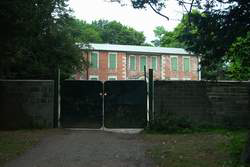Abandoned Communities ..... Imber
Although most of the male residents of Imber were engaged in agricultural work quite a lot of them pursued a variety of other jobs, professions, and craft or cultural activities. People tended to combine two or three occupations. Harry Meaden, for example, was the village boot and shoe maker, but would also take a turn at sheep shearing. In addition he was a church elder, taking services accompanied by a small dog. Postmen would complete their rounds on foot or by bicycle and then perform odd jobs around the village until it was time to collect the outgoing mail at around 4.00 pm. One of the landlords at the Bell Inn also managed the windmill on Chapel Down. Thomas Carter’s career began with a spell as a shepherd, but later he became a gardener at Imber Court, while pursuing his musical interests in his spare time. He joined a small band comprising four violins, a flageolet, and his cello, who would perform at the vicarage and give occasional public concerts.
Shops and businesses in Imber included a carpenter’s shop, a blacksmith’s forge, a combined bakery and grocery shop, and the general provisions store run by Eliza “Granny” Staples. There was no policeman based in the village. Minor infringements would be dealt with informally, but if necessary the special constable could be summoned.
A profession specifically associated with Imber was the making of dewponds. One dewpond construction company comprised four men, Charles White, Joel Cruse, Jabez Earley, and Daniel Pearce. They continued to work until reaching an average age of 79. During the summer they would travel around southern England constructing or repairing ponds. In spite of the name it appears that most of the water that entered the ponds came from rainfall.
From the 1840s there were two schools in Imber. The National School, associated with the church of St Giles, was established in 1836, and the British School opened in 1844. The British School was linked with the Baptist church, and as most Imber inhabitants were non-conformist its school roll was generally well above that of the National School. However, in 1895, after school fees had been abolished, the British School closed and its pupils were transferred to the National School. Turnover among teaching staff tended to be high, with most teachers unwilling to stay long in such an isolated community. One exception was Rebecca Pocock who stayed to marry Bob Hooper from Brown’s Farm. Bob Hooper had proposed marriage after a party at the vicarage where he had heard Rebecca Pocock singing The Last Rose of Summer.
The words of The Last Rose of Summer and two alternative versions of the tune can be found at this address.
Census information about Imber reveals that the population of the village reached its maximum in 1851, when 440 people were recorded. A steady decline then occurred, and in 1931 the number was down to 152.
During the 1920s and 1930s farming communities such as Imber were affected by the general economic situation and in particular by the increase in imports of agricultural goods and the trend towards mechanisation. Opportunities for employment within the village would have declined, and young people were inclined to look for work elsewhere.
Shops and businesses in Imber included a carpenter’s shop, a blacksmith’s forge, a combined bakery and grocery shop, and the general provisions store run by Eliza “Granny” Staples. There was no policeman based in the village. Minor infringements would be dealt with informally, but if necessary the special constable could be summoned.
A profession specifically associated with Imber was the making of dewponds. One dewpond construction company comprised four men, Charles White, Joel Cruse, Jabez Earley, and Daniel Pearce. They continued to work until reaching an average age of 79. During the summer they would travel around southern England constructing or repairing ponds. In spite of the name it appears that most of the water that entered the ponds came from rainfall.
From the 1840s there were two schools in Imber. The National School, associated with the church of St Giles, was established in 1836, and the British School opened in 1844. The British School was linked with the Baptist church, and as most Imber inhabitants were non-
The words of The Last Rose of Summer and two alternative versions of the tune can be found at this address.
Census information about Imber reveals that the population of the village reached its maximum in 1851, when 440 people were recorded. A steady decline then occurred, and in 1931 the number was down to 152.
During the 1920s and 1930s farming communities such as Imber were affected by the general economic situation and in particular by the increase in imports of agricultural goods and the trend towards mechanisation. Opportunities for employment within the village would have declined, and young people were inclined to look for work elsewhere.
Two
Imber Court in 2005
